We’ve all experienced moments in our academic journey when we lose motivation, become procrastinators, and stop seeing the meaning behind our actions. These moments are natural, often occurring when faced with challenges or feeling fatigued by the daily routine. Learning is not always easy, but having a clear goal helps us move confidently toward success.
The Japanese ideology of ikigai centers around the process of discovering your purpose. This principle not only helps you find motivation in your studies but it can also serve as the driving force behind your daily actions, enriching your life with meaning. So, how do you uncover your ikigai? And what does it consist of? Our expert team will explore these points in this article.
🌸 What Is Ikigai?
Let’s start at the very beginning of the journey—what is ikigai, and why is it so important?
Translated from Japanese, ikigai means “the reason for your existence,” where “iki” signifies life and “gai” denotes value. This philosophy encompasses the entire lifestyle of the people of Okinawa, Japan, who use ikigai to find a purpose in life that inspires them to wake up each day. This approach is considered one of the reasons for longevity in Japan.
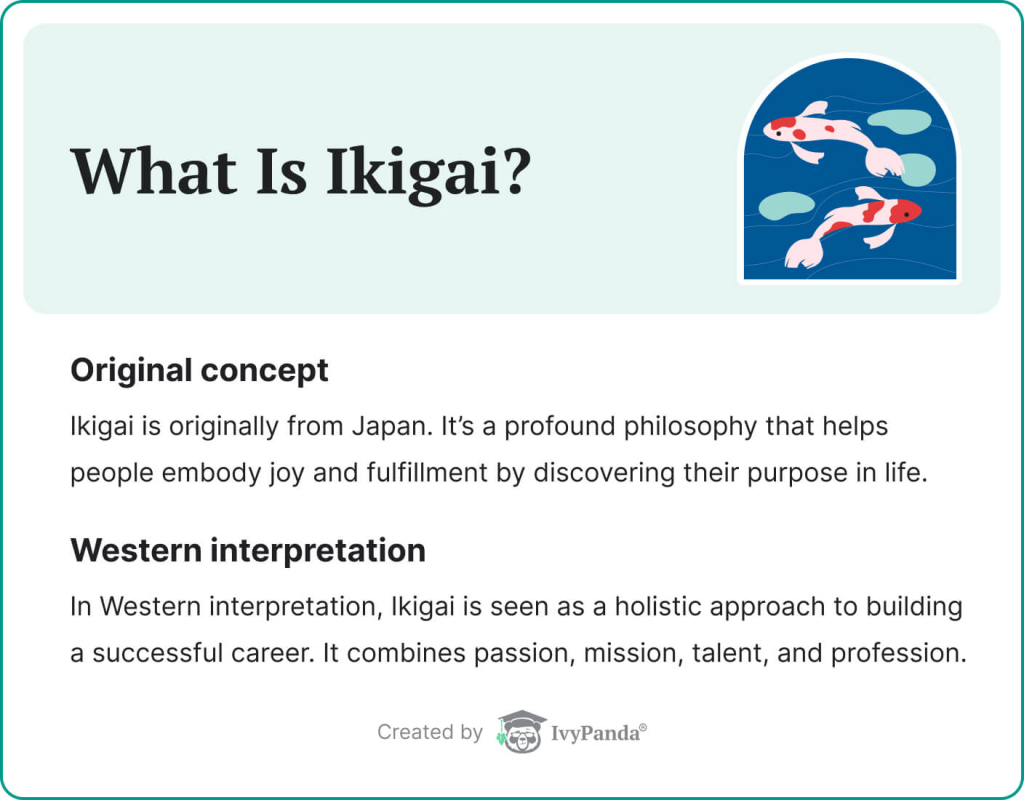
Representatives of Western culture have also embraced this concept, believed to have been popularized by Albert Lieberman and Hector Garcia, the authors of the book IKIGAI: The Japanese Secret to a Long and Happy Life. However, in their adaptation, ikigai serves as a tool to assist in finding the career of your dreams. Thus, the slogan “life is worth living” was transformed into “work is worth doing.”
The popularity of this career choice is related to the fact that ikigai fosters a sense of purpose and self-worth. It helps you express your inner self. As you embark on your search for your ikigai, you’ll need to learn to understand yourself and overcome challenges to achieve inner happiness and harmony with your work.
Ikigai and Learning
So, how will this life philosophy help students in their studies?
Since everyone has a unique worldview and vision of their life’s course, ikigai serves as a guiding tool in the right direction. It fosters self-acceptance and understanding. The feeling of flow and dispersion of your efforts across various spheres can often lead to burnout. However, through self-discovery, you’ll be able to redirect your focus towards the pursuits that hold personal significance, rather than paths imposed by society or chosen out of desperation.
Discovering your mission makes the pursuit of your goals more rewarding and facilitates motivation for self-fulfillment. Engaging in tedious work, studying uninteresting subjects, or getting bad grades can make the time drag on unbearably long. However, discovering your passion infuses enthusiasm into the process, making it quick and enjoyable. Moreover, it provides a source for wholesome leisure time, allowing you to rest your body and soul. Ikigai can become the secret to your well-being!
The Components of Ikigai
To discover your ikigai, you’ll need to do some self-reflection and consider the things that inspire you. Below, we will delve into the Western interpretation of this philosophy, which consists of four key components. Take a look:
- What are your talents? Your professional skills and inherent gifts.
- What are your passions? Things you love and hold dear.
- How can you contribute to the world? What the world needs and how you can give back.
- How can you earn a living? Something for which you will be appreciated and rewarded.
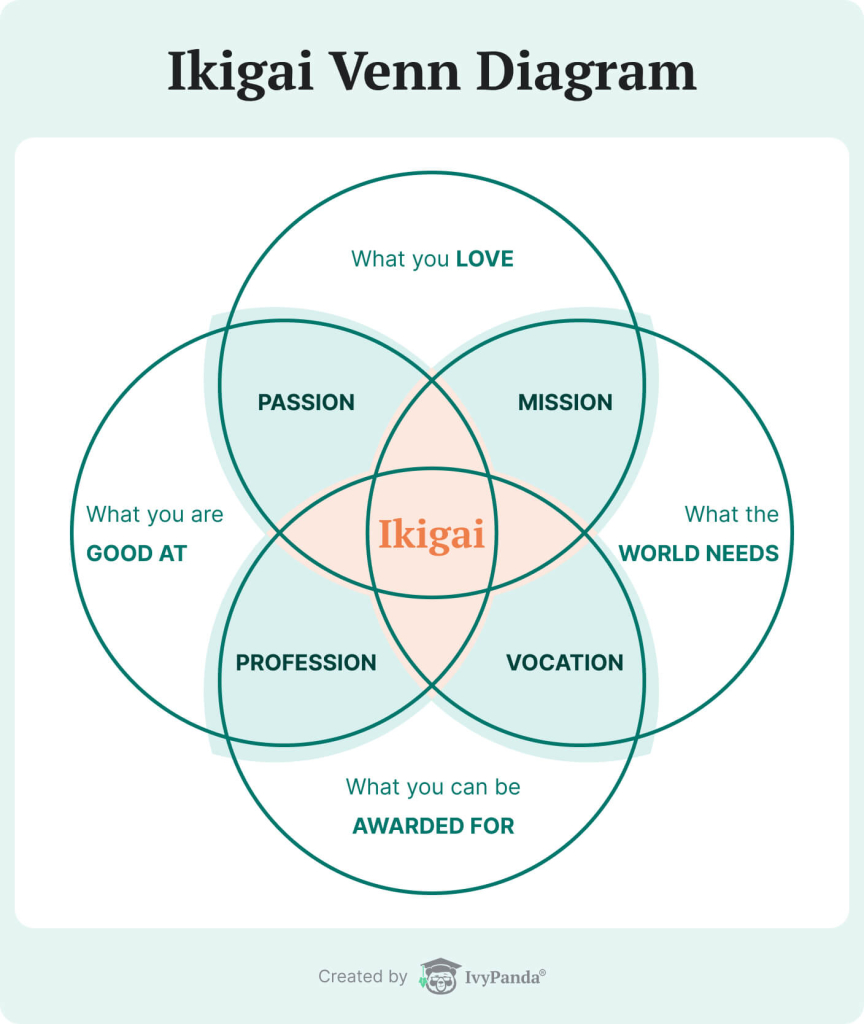
These components intersect, as you can see in the Venn diagram. At the heart of it lies ikigai—your golden mean. Each response you provide affects the final outcome. You can start by exploring a broad range of potential purposes and gradually narrow down the circle to a few choices. These choice will be near-perfect and encompass all your life needs.
What’s most significant is that you will arrive at this decision on your own, free from doubts, prepared to devote your life to it. Although you do not need to be rigid in this matter, you can always revisit it. Change is constant, and everything around us evolves. Stay open to experimentation and adjustments in your pursuit of happiness!
⛩️ The Pillars of Ikigai
However, we can’t proceed without telling you about the original purpose of ikigai for approaching life holistically. In this section, we’ll outline the 5 main pillars emphasized by writer and Tokyo neuroscientist Dr. Ken Mogi in his book Awakening Your Ikigai: How the Japanese Wake Up to Joy and Purpose Every Day.
- Starting small. Embrace living in the present moment. Find joy in every step toward your goal, no matter how small, and value your efforts.
- Releasing yourself. Accept yourself fully, embrace all your peculiarities, and refrain from comparing yourself to others. Live authentically according to your unique lifestyle.
- Being harmonious. Strive to achieve harmony not only with nature but also with society. Recognize the impact of your actions and words, and refrain from acting solely out of selfish desires.
- Find joy in the little things. Allow yourself simple pleasures, even if you believe you don’t deserve them. Give yourself small treats to create more moments of happiness throughout your day.
- Being in the here and now. Reconnect with your inner child, who appreciates the present without dwelling on the past or worrying about the future. Do not weigh yourself down with social roles. Embrace creativity and freedom in your experiences.
🗺️ How to Find Your Ikigai
Now that we understand what ikigai entails, we can move on to the core of this guide — how can you find it for yourself? Indeed, uncovering your purpose is no simple task. To streamline the process for you, we have divided it into three parts: asking questions, brainstorming, and studying and researching.
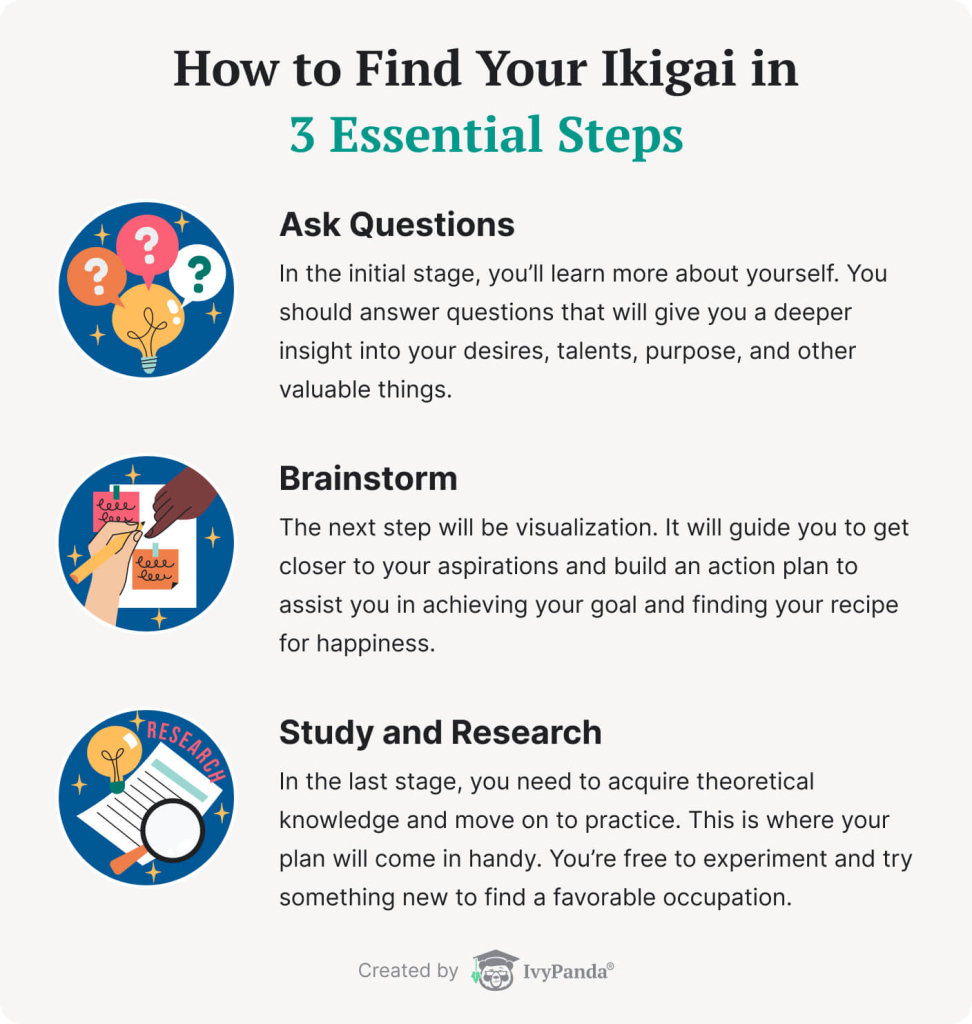
Explore each of these steps in detail to embark on the journey of discovering your ikigai.
Ask Questions
The first step we suggest may seem straightforward, but it’s also one of the most challenging – you will need to answer questions about yourself. Using the four components outlined earlier, we have produced a list of guiding questions to help you get started.
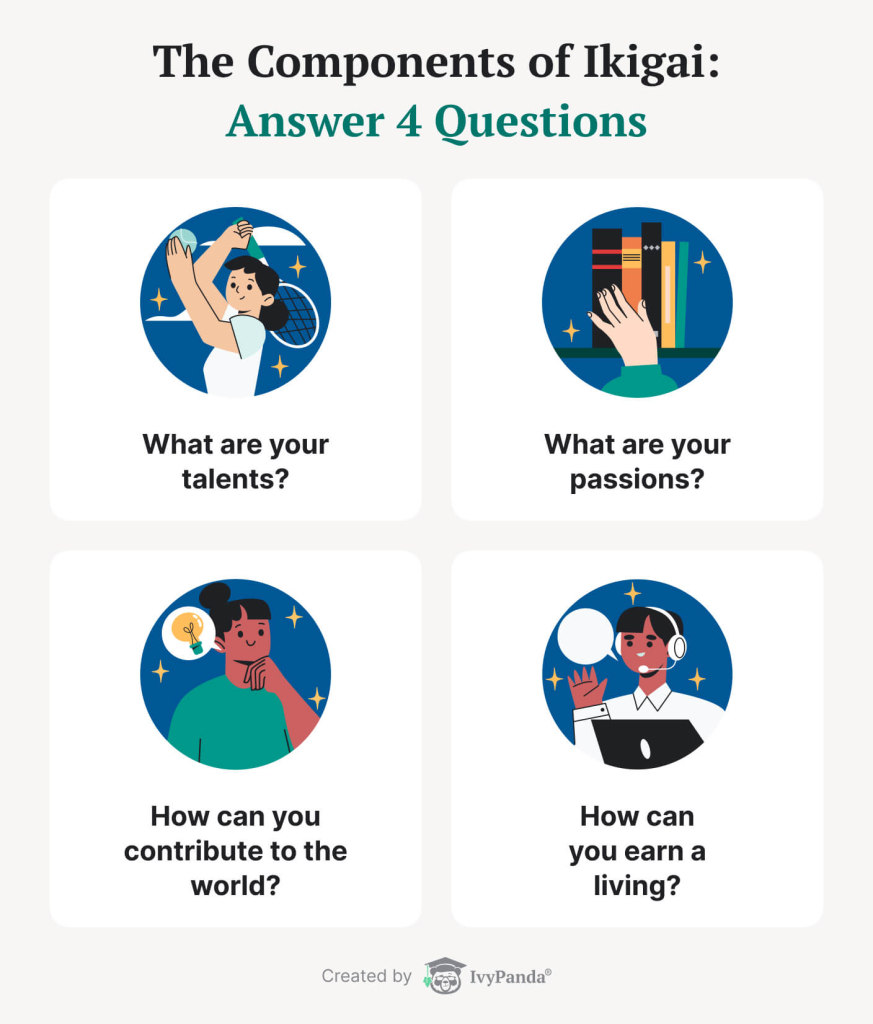
What are your passions?
If you are still studying:
- Are you deeply engaged in what you are studying?
- Do you feel enthusiastic and motivated about your studies?
- Are you satisfied with your academic achievements?
If you are already working:
- Are you gratified with your current job?
- How do you feel at work?
- Do you experience fulfillment in your role?
What are your talents?
If you are still studying:
- Do you find your academic subjects come naturally to you?
- Are you eager to go into further studies to become an expert in your field?
- Do you feel confident about your chosen career path?
If you are already working:
- Do colleagues turn to you for advice at work?
- Do you consider yourself one of the best in your field?
- Are you praised for how you do your job?
How can you contribute to the world?
If you are still studying:
- Is your future profession in demand on the job market?
- What are the growth prospects in your chosen field?
- Can you address any global issues through your career?
If you are already working:
- Are you a sought-after employee? How replaceable are you?
- How relevant will your profession be in the next 10–15 years?
- In what political, environmental, or socioeconomic areas are you making a positive impact?
How can you earn a living?
If you are still studying:
- Have you researched the average income in your field?
- Will your chosen career path meet your financial needs?
- Would people be disposed to pay for the services you plan to offer?
- Do you anticipate success in your future profession?
If you are already working:
- Are you content with your compensation for your efforts?
- Does your income support your desired way of life?
- Do you face reasonable competition in your field?
- What are your vocation advancement opportunities?
Brainstorm
After you have thought about the questions above, it’s time to engage in a brainstorming session to visualize your answers. This exercise will help you clarify your ideas and intentions.
- Envision your perfect day. Picture your day from sunrise till sunset. Imagine what you will wear, who you could interact with, and what tasks you might finalize. Consider how each facet of the day could contribute to your happiness and bring you closer to your objectives. Write down all of your insights.
- Complete the Venn diagram. Check out the diagram we provided above to map out your responses. This exercise will help you recognize any gaps and gain clarity on how your intentions align with your goals.
- Track your progress. Finally, a friendly reminder — don’t be afraid to modify and polish your objectives. We recommend reviewing your ikigai diagram at least every 2–3 years. This way, you can track the development of your achievements and update your life goals. Above all, enjoy the journey!
Study and Research
While introspection is crucial in discovering your ikigai, practical application is equally essential. It’s time to explore courses, seek out tutors, or enlist the help of a coach who can assist you in acquiring the necessary skills to achieve your goals. After all, what may appear interesting to you in theory may not translate the same way in practice.
For example, you may have wanted to become a pastry chef, but you didn’t anticipate the cost of the cupcakes or your potential earnings from them. Or perhaps you lack the right equipment for perfecting biscuit or cream. However, remember that while your dream career may have its downsides, your purpose is to find an occupation that will bring you enough happiness to outweigh any cons.
Besides, we have a few more ideas on how you can track down and assess your alignment with your ikigai. Try our questionnaires! Here are the most popular ones:
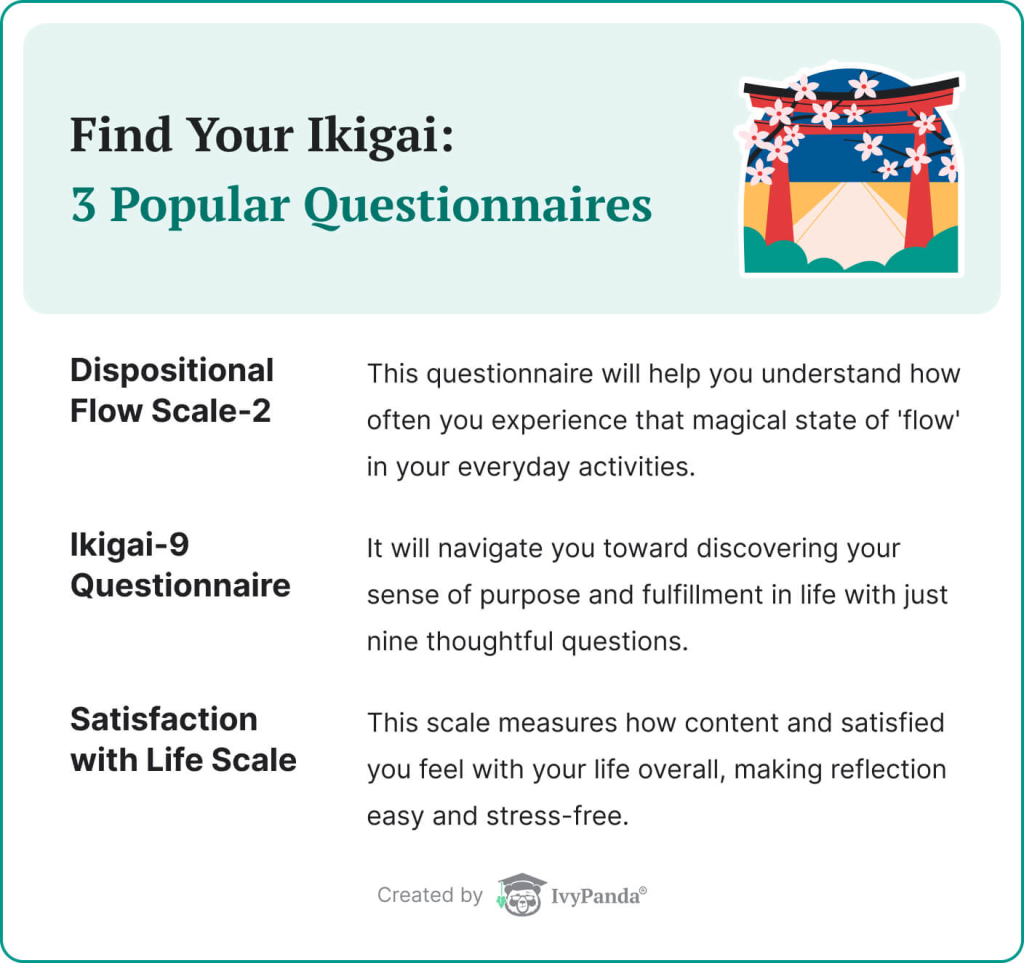
Dispositional Flow Scale-2
This scale measures your flow state, indicating how well your ikigai aligns with your psychological well-being. Ikigai experts Hector Garcia and Francesc Miralles suggest that dispositional flow enables individuals to forget their troubles and fully enjoy life.
The scale consists of 9 elements that measure the effectiveness of your ikigai:
- The merging of awareness and action
- Sense of control
- Self-awareness
- Concentration
- Balance of skills
- Time management
- Feedback
- Experience
- Objectives
Ikigai-9 Questionnaire
By completing this straightforward questionnaire, you can assess your feelings towards life, serving as a kind of therapy in itself. It will reveal the extent to which you value your existence and anticipate the brightness of your future. It will also show you how well your ikigai is working for you. Consider the following statements:
- I often experience happiness.
- I would like to learn something new or start something new.
- I feel I am valuable to society.
- I am open to new experiences.
- I am interested in many things.
- I believe my existence has a purpose.
- My life is fulfilling and spiritually enriched.
- I strive for personal growth.
- I believe that my opinions have value and influence.
Satisfaction with Life Scale
Finally, life satisfaction directly impacts your well-being and is related to the fulfillment of your ikigai. Your level of happiness impacts your emotional state and your pursuit of self-realization. To discover how satisfied you are with your life, you’ll need to answer several questions by assigning a score from 1 to 7:
- How satisfied are you with your life?
- How closely does your life align with your ideal?
- Have you achieved your goals in life?
- How do you evaluate the circumstances of your life?
- Would you change anything if you could live your life again?
📚 Practical Tips for Embracing Your Ikigai
So, you’ve discovered your ikigai—but what’s next? How do you integrate this philosophy into your daily life? Here are some practical tips to guide you along your journey:
- Develop a plan: Start by creating a year-long plan with small goals for each month. For example, if you aim to learn to code or create a successful blog, break it down into small steps you can pursue alongside your studies or work.
- Be productive: Consider what skills will help you in your future career, such as teamwork. Set weekly or daily goals for small victories, such as completing a task from a training program or reading a thematic article.
- Keep your plan visible: Track your progress on a chart. Whether on paper, digitally, or as a printed poster, having your ikigai in front of you will motivate you every day.
- Get support: Seek out a mentor, teacher, or coach who has already achieved your dream. Consider joining a group with people who share your ikigai to exchange experiences and tips.
- Improve your formula for happiness: Reflect on what enriches your life. If overwhelmed, set recreational goals, like watching a movie with friends or taking a walk in the park.
- Be prepared for difficulties: While ikigai is considered a path to longevity and harmony, acknowledge that challenges are part of life. Believe in yourself and continuously improve to pursue career advancements or start your business.
Don’t worry; finding your ikigai may take time. Congratulations if you have found your purpose in life, but don’t stop searching if you’re still seeking. We hope this article helps you find your unique ikigai! Feel free to share it with friends on their journey to finding their purpose.
📎 References
- Ikigai: The Japanese Secret to a Joyful Life. – The Government of Japan
- How to Find Your Ikigai and Transform Your Outlook on Life and Business. – Chris Myers, Forbes
- Ikigai: A Japanese Concept to Improve Work and Life – Yukari Mitsuhashi, BBC
- Ikigai Meaning: How to Find Your Life Purpose. – MasterClass
- Do What You Love and Live Longer, the Japanese Ikigai Philosophy Says. – David G. Allan, CNN



